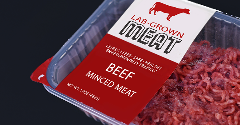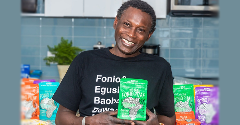News
The corporates fighting food insecurity: Are they doing enough?
4 Jul 2022Brands are increasingly taking steps to combat food insecurity, yet the number of people globally unable to access nutritious food is rising. Is enough being done to ensure the security of the global food system?
In almost every county across the world, people are suffering from extreme hunger and poverty, unable to access the basic food and drink supplies necessary to sustain good human health. Global crises that have taken place over recent years such as the Covid-19 pandemic and Russia’s invasion of Ukraine have had devastating effects on global food insecurity, disproportionately affecting the poorest and most vulnerable proportions of society.

From 2019 to 2020, the number of people who were considered as being acutely food insecure, meaning unable to access safe, sufficient food, rose by close to 40 million to reach a staggering 193 million people, according to the Global Report on Food Crises 2022. This number is on the rise.
Since the pandemic began over two years ago, the number of severely food-insecure people has doubled to over 276 million. As the fallout from ongoing environmental, political, social and economic crises continues to send shockwaves through the global food system, this total is projected to rise to 323 million people by the end of the year, the UN’s World Food Programme (WFP) predicts.
We have now reached a precipice where brands must take responsibility for minimising the most pressing risks to the current food system. Consumers are increasingly demanding that food-related businesses including grocery retailers (70%) and restaurants (62%) prioritise corporate responsibility by committing to environmental, social, and political causes that are in line with their business activities. The findings from a Clutch survey show that for consumers, the top expectations of food manufacturers are tackling food insecurity by feeding those in need (67%), supporting local farmers (48%) and local events (40%), and selling non-GMO foods (40%).
Recently, we have seen key players in the food industry respond to this call for action by implementing partnerships, programmes, and policies which above all, seek to increase access to safe food for the world’s most vulnerable, and improve the reliability and security of global food systems.
Nevertheless, there is still a long way to go before global food security is achieved. What actions are brands taking to safeguard the health of the global population and establish food systems that are sustainable and secure? And what more must be done?
Mars and World Food Programme collaborate to improve food safety
As the environmental, social and governance (ESG) credentials of brands become increasingly important to consumers and the threats to global food security continue to rise, many companies are taking steps to improve the ways in which they produce, distribute, and manage food.
In December 2021, global food giant, Mars, renewed its partnership with the World Food Programme (WFP), the world’s largest humanitarian organisation fighting hunger, to improve the access of vulnerable communities across the globe to safe and nutritious food.
Since 2015, the two organisations have worked collaboratively to strengthen food safety systems and improve access to safe food, in aim of improving the resilience of the global food supply chain. A Food Safety and Quality Programme was set up to support smallholder farmers and suppliers to access knowledge, safeguard livelihoods and preserve crops, as well as training distributors to store and transport food safely.
“The industry-leading knowledge and experience that Mars brings to World Food Programme (WFP) adds considerable value to our work in food safety and quality, helping expand our capacity at global and local levels, through strategic guidance, training, and processes to strengthen resilience throughout our supply chains,” said Virginia Villar Arribas, deputy director of private sector partnerships, World Food Programme.
In addition to exchanging insights, expertise and advice via conferences and events, the collaboration has benefitted millions, from farmers to families to food producers, across the world, according to Mars and WFP.
Cargill pledges $13 million to combat hunger
Similarly, one of the world’s largest food manufacturers, Cargill, has pledged over $13 million in grants to programmes that aim to improve the lives of over one million people across 15 countries globally.
Working alongside over 20 partners comprising the likes of CARE USA and The Nature Conservancy, the grantees range from multinational NGOs to local, grassroots support organisations and focus on scaling long-term, high-impact programmes. Among the core aims of the programme are advancing practices of sustainable agriculture, supporting child nutrition, improving market access and productivity for farmers, and promoting healthy diets while combatting diet-related health conditions in vulnerable communities.
“We’re investing in scalable solutions that make a real difference for people and communities,” said Cargill vice president of corporate affairs, Ruth Rawling. “The private sector can be a catalyst for lasting change by jumpstarting innovation and economic development.”
One grant recipient for instance, Heifer International, uses the capital to fund the expansion of female-run, family-owned poultry farms in China, while another, The Nature Conservancy, seeks to increase its conservation efforts and fight against deforestation in Brazil, Paraguay and the US.
Are brands doing enough?
Despite the pledges from many large corporates such as those mentioned above, the question as to whether these companies are doing enough to incite meaningful and lasting change remains.
A closer look at the figures reveals that the actions of large corporates in combatting food insecurity and world hunger have, in reality, had little overall impact on decreasing the percentage of hungry people in the world, which in the five years to 2019, remained at a steady 9%. Data from the UN Food and Agriculture Organization (FAO) North America and International Food Policy Research Institute (IFPRI) shows that hunger numbers have in fact trended upwards over the past six years, with an additional 60 million plunged into hunger between 2014 – 2019.
Instead of moving away from Zero Hunger, the actions of brands could be seen to be pushing us closer towards it. According to FAO chief economist Maximo Torero, one key driver of this is the unaffordability of healthy food, which results in three billion people unable to access good nutrition.
To truly transform food systems and end food insecurity, brands must be prepared to place people over profit, focussing on improving the efficiencies and lowering the costs of producing nutritious food, Torero said.
Related news

Israel approves Aleph Farms’ cell-cultured beef in world first
1 Feb 2024
Israel has granted the first regulatory approval for the commercial sale of cultivated beef, joining the US and Singapore in officially recognising cultivated meat’s role towards protein diversification.
Read more
Fazer and Solar Foods launch snack bar made with air protein
30 Jan 2024
Finnish food manufacturer Fazer has teamed up with foodtech startup Solar Foods to launch a limited-edition snack bar in Singapore made using a novel, carbon-fed microbial protein.
Read more
Big brands invest in precision fermentation-derived palm oil
25 Jan 2024
Although still not approved for food applications, big brands such as Unilever and Doehler are investing in precision fermentation-derived palm oil in a bid to reduce the environmental impact associated with this conventional palm oil.
Read more
Supergrain fonio expands its reach in US market
11 Jan 2024
More US consumers will find nutritious, climate-smart grain fonio in supermarkets thanks to a new distribution structure for the import’s most prominent commercial brand, Yolélé.
Read more
Sustainability meets innovation at Fi Europe 2023's Sustainability Ingredients Zone
9 Jan 2024
Fi Europe’s Sustainable Ingredients Zone showcases ingredients forging a path toward a greener future. Three innovators are redefining what sustainability within the food and beverage industry means, with upcycled products, regenerative agriculture, an...
Read more
Supermarkets innovate with private label plant-based ranges
9 Jan 2024
Plant-based product ranges are an important part of retailers’ private label innovation efforts – and represent an important way for supermarkets to reduce their environmental impact.
Read more
The UK prepares to open food security science centre
2 Jan 2024
Amid global food insecurity, the UK government says it is committed to producing crops resilient to climate change and addressing hunger and malnutrition with a food security science centre.
Read more
Novel food safety platform could eliminate animal testing
21 Dec 2023
The European Food Safety Authority (EFSA) has introduced a new platform that has the potential to eliminate animal testing in the food industry.
Read more
Water-conscious consumers, upcycled food, and tech-driven sustainability: Highlights from Fi Europe, part 2
14 Dec 2023
With climate change becoming a tangible reality, consumers’ environmental concerns are changing. At Fi Europe, market analysts revealed how people are now interested in everyday issues like water shortages and tech-driven solutions such as GM drought-r...
Read more
The food industry’s single-use packaging problem
12 Dec 2023
The food industry’s reliance on single-use packaging is a sustainability “sticking point” with viable alternatives not widely available – but new EU rules mean food businesses will remain responsible for the collection and disposal of the packaging the...
Read more